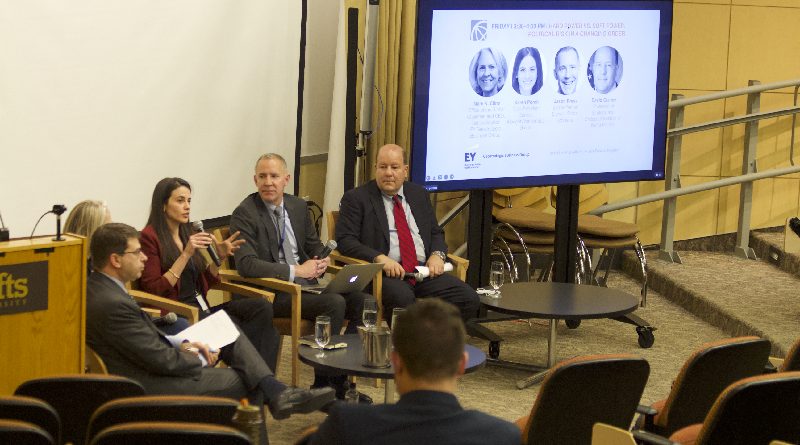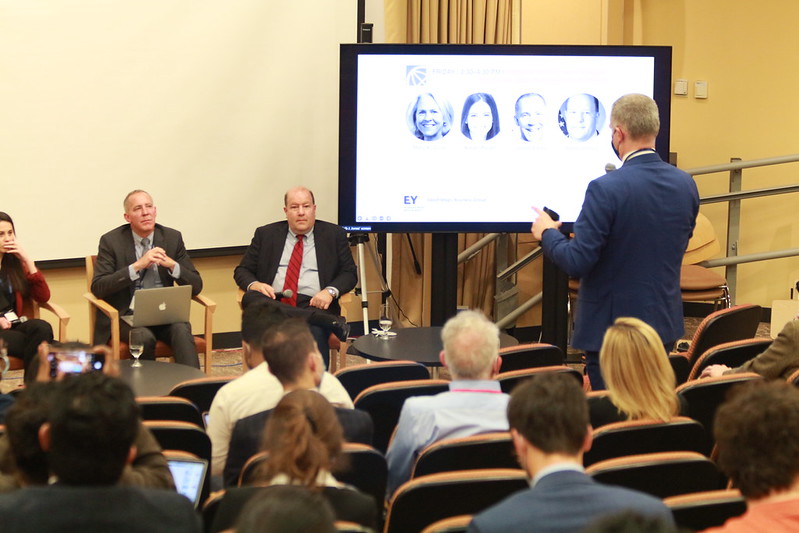China is not Russia and Xi is not Putin: Experts Discuss The Impact of Soft Power in Global Politics
By Vishal Manve, MALD 2023 Candidate, The Fletcher School
On April 15, 2022, The Fletcher Political Risk Group organized the Political Risk Conference spanning two days and comprising multiple sessions discussing the global geopolitical matrix, hard power, soft power, and risks of emerging technologies.
The conference brought together panelists and experts from Albright Stonebridge Group, EY, Signum Global Advisors, Institute of World Politics, Control Risks, Microsoft, and Enquire AI and concluded the much-anticipated Case competition.
On April 16, 2022, Professor of International Politics, Daniel Drezner moderated the panel ‘Hard Power vs Soft Power: Political Risk in a Changing Order’ at the ASEAN Auditorium. The session included panelists Mary K. Cline (EY Geostrategic Business Group), Karen Poreh (Albright Stonebridge Group), Jason Press (Signum Global Advisors), and David Glancy (Institute of World Politics).
“Soft power is the ability to attract, and hard power is the ability to coerce. In the 1990s and 2000s, companies were given a long runway to invest in places where the values did not match the western values. The businesses were encouraged to go global and the calculation was that these developments would help these countries also go global,” Mary said at the conference, outlining how businesses were considered tools of soft power.
This calculation has been turned on its head since February 24, 2022, and businesses that were sitting on the fence are now figuring out their next steps after the Russian invasion of Ukraine.
On the question of the impact of civil society in pressuring businesses to take a stand, Poren said the dual impact of the pandemic and the Russian invasion of Ukraine has created a global impact.
“We have seen soft power and its impact on companies to take positions, but with Ukraine, the scale is something we have not seen before and focusing on reputational concerns for businesses. Many have suspended operations and this pressure came from grassroots movements,” Poren added.
She further explained how Ukraine had called out companies for their role in Russia while Yale had published a report outlining firms and their investments in Russia.
“These companies had to figure out what the list meant and reconsider their roles and figure out their sense of values in line with the values of their home governments,” Poren added, further underscoring how the tension with China was a factor that the West should anticipate and analyze next.
“Corporates are not necessarily choosing values, over valuations but perhaps they can choose both at the same time,” Jason said. He further outlined how corporates seemingly are not pulling out of Russia because of public pressure but because of its impact on their profitability elsewhere globally.
“Economic interdependence with China is too powerful and U.S.-China relations will improve with improving trade, tariffs, and negotiations, but Taiwan remains a big risk on the table. We see a 65 percent projection that there will be a regime change in Taiwan and the U.S. will have to deal with it,” Jason added.
On the impact of the Ukrainian invasion, David said the European Union has been united, and the U.S.-EU relations are “solid and the Cold War alliance has been reinvigorated and there has been a unified front globally” against the Russian aggression.
He further added the Russian Federation will not retain its role as a great power and not be counted in the leagues of the United States or China.
“More great power competition with China and political warfare will take center stage and supply chain issues, instability will be a golden age for political risk consulting groups. There will be opportunities and risks,” David further added.
Comparing China and Russia, Mary added that China is an “ascending power with a stake in the global game and with increasing cultural, economic and political power while Russia is a descending power.”
“There is still opportunity in China and the U.S. and Western governments can use diplomatic tradecraft and statecraft to foster relationships,” Mary added.
“Russia is not China and Xi is not Putin and we should understand China’s ambitions. We should have listened to Putin and now we must listen to Xi Jinping after he is reelected at the 20th Congress. I see some parallels between China and Russia and the West cannot afford to stop China’s diplomatic ties or economic power,” Jason added.
On the China front, David offered caution on either overestimating or underestimating the Asian giant’s prowess amid huge Western investments in the country.
“I don’t underestimate or overestimate China and they are not a 10-foot giant that we need to be fearful of,” David said.
On political risk consulting, Mary added that the job has changed as companies and their “risk sensitivity to political risk is changing and the process of project assessment needs to be revisited multiple times.”
“There are a lot of places where risk profile becomes more lucrative once companies feel they can manage the risk and they will stay global. We need to see opportunities and Western firms should focus on and be present in Sub Saharan Africa as well,” she concluded in response to a question on the lack of Western investments in the region.


